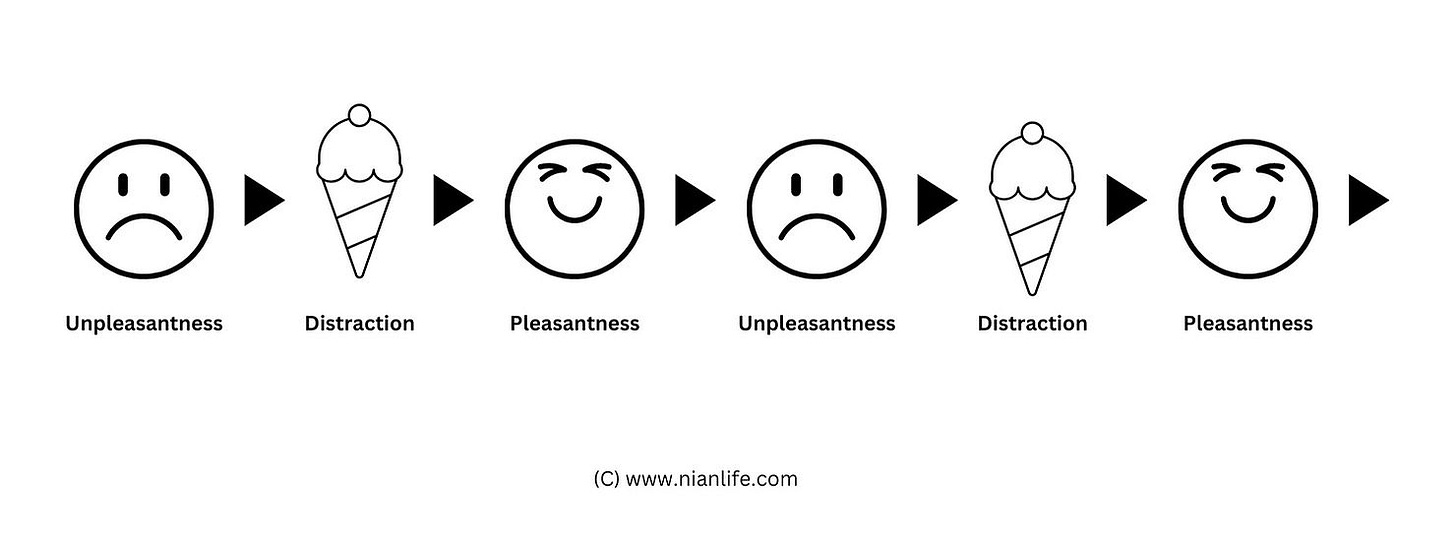A Wiser Approach to Dealing with Discomfort
Replacing unpleasantness with pleasantness is a strategy, but it's certainly not a helpful one.
Nobody likes feeling uncomfortable.
Whenever we meet with discomfort - whether in the form of physical pain or mental anguish, we immediately form the judgement that this experience is unpleasant and bad for us. This judgement towards discomfort tends to invite more discomfort, and then we find arising within ourselves the desire to will those unpleasant feelings away.
What happens next is how we choose to deal with this discomfort.
Usually, when we cannot do anything to change the experience, our first instinct is to divert our attention and distract ourselves from the unpleasantness.
We want to get rid of the discomfort so badly that we turn to something we feel would offer us just the opposite - we seek experiences that feel good and pleasant to us in a bid to relieve ourselves from unpleasant ones.
We crave comfort food when we feel stressed; we lose ourselves in mindless scrolling on the phone while a pile of work awaits us; we order another glass of wine to curb the anxiety we feel at a social event; we spend hours shopping online just so that we don't have to face the discomfort of being alone at home.
But alas - pleasant feelings do not last. When the pleasantness we enjoy inevitably fades, we are once again confronted with the reality of our experience - discomfort.
We are then compelled to begin the whole cycle again: judge the discomfort as bad, feel the desire to get rid of the unpleasantness, distract ourselves with something pleasant. This is how we form many of our habits and even addictive behaviours.
Replacing unpleasantness with pleasantness is a strategy, but it's certainly not a helpful one. At best, it provides some relief for a couple of hours; at worst, escapism becomes an autopilot behaviour that dominates our decision-making and restricts our sense of agency in navigating our way of life.
How then, should we deal with discomfort?
We start with knowing two things:
We are bound to encounter unpleasant experiences in life, and so resistance towards unavoidable unpleasantness is futile and even unhelpful.
Just as pleasant feelings do not last, unpleasant feelings do not stay with us forever either.
When we are able to see that our experiences - whether pleasant or unpleasant - are impermanent, we can begin taking a more sensible approach towards working with discomfort, by practicing mindfulness.
We learn not to run away but turn towards discomfort. We practice staying with the experience rather than distracting ourselves. We learn to observe the uncomfortable experience with non-judgemental awareness (i.e., not evaluating it as "good" or "bad", and just as an experience), one moment at a time.
We don't actually need to do anything or interfere with our experience - we simply wait. We allow the unpleasantness to be here and manifest for some time, and eventually witness the unpleasant feelings fading away.
This kind of mindful attention, when employed with compassion and wisdom, works wonders for riding the waves of our experiences with greater ease.
With such practice of mindful awareness, we are less likely to be fall into the unpleasantness-distraction-pleasantness loop, and more likely to change our relationship with discomfort altogether.
------






